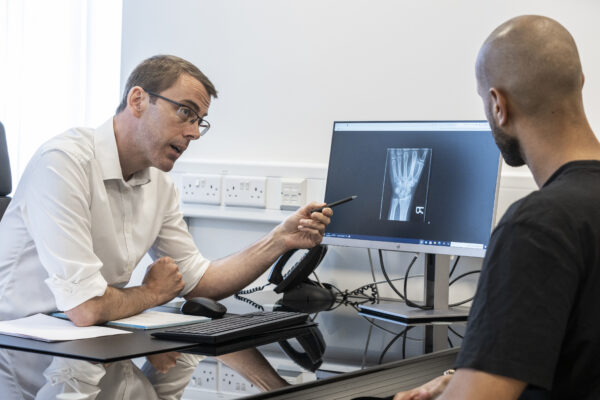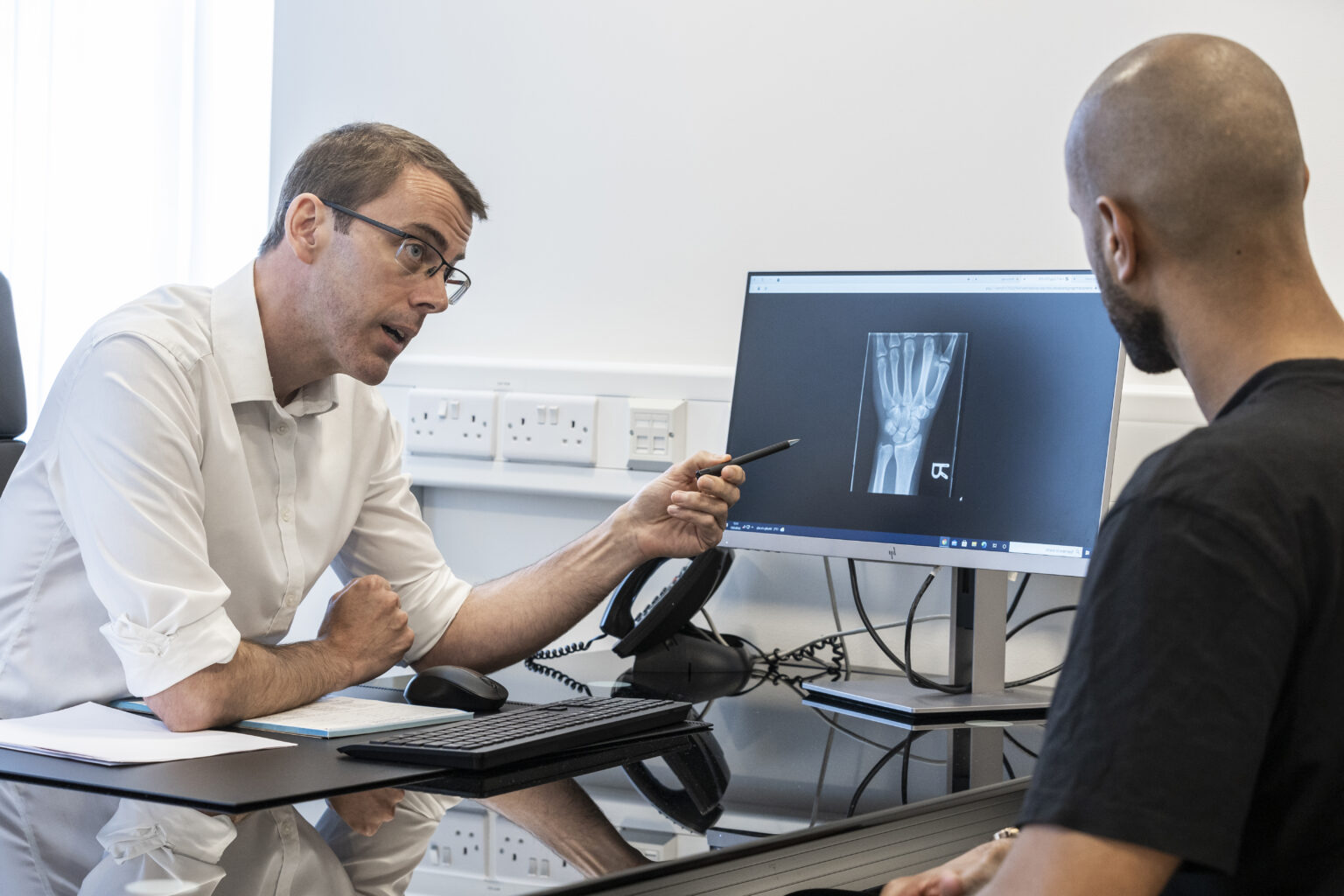Contact number: 020 7806 4060
What is Dupuytren’s disease?
Dupuytren’s disease, also known as Dupuytren’s contracture, is a benign condition that affects the fibrous sheet of tissue called the fascia. The fascia is a flexible connective tissue that surrounds and supports every part of your body. Dupuytren’s disease causes the fascia in the hand to thicken and become less flexible. Over many months or years, this can cause one or more of the fingers to bend toward the palm. Dupuytren’s can affect one or both hands.
The cause of Dupuytren’s contracture is not fully understood, but it is more common in men than in women and often runs in families. It is more common in people of Northern European descent.
What is Needle Fasciotomy?
Needle fasciotomy is a non-surgical treatment for Dupuytren’s contracture. It involves using a fine needle to release the thickened cords of tissue in the palm. This procedure allows the affected fingers to straighten and improves range of motion.
Performed under local anaesthesia, needle fasciotomy is a quick and minimally invasive option, often recommended for patients with mild to moderate cases of Dupuytren’s contracture. It requires little downtime, making it an appealing alternative to open surgery.
Located in St John’s Wood (NW8), our hospital offers needle fasciotomy in modern facilities, focusing on effective treatment and patient-first care.
Needle Fasciotomy at St John & St Elizabeth Hospital
At St John & St Elizabeth Hospital, we provide needle fasciotomy as part of our comprehensive hand surgery services. Our skilled surgeons assess each patient’s condition to determine the most suitable treatment plan.
Why choose us for needle fasciotomy?
- Expert Hand Surgeons: Our consultants have extensive experience in treating Dupuytren’s contracture with needle fasciotomy and other advanced methods.
- Minimally Invasive Procedure: Needle fasciotomy allows for quicker recovery compared to open surgery.
- Modern Facilities: Our facility is equipped with the latest medical equipment, enabling our specialists to perform precise diagnoses and deliver effective treatments.
- Accessible Location: Conveniently based in NW8, we serve patients from Hampstead (NW3), Kilburn (NW6), and across London.
We are committed to helping you regain hand function and confidence with personalised and expert care.
Consultants who perform Needle Fasciotomy in London
How Much Does Private Needle Fasciotomy Cost?
from £2,075*
The price shown includes all costs associated with your treatment, from admission to discharge. Doesn’t include surgeon or anaesthetist fee. Our hospital fee is guaranteed at the price quoted and valid for one month from the date issued, subject to pre-assessment.
|
Dupuytren's contracture surgery (one finger) |
£2,075 |
|---|---|
|
Dupuytren's contracture surgery (palm only) |
£2,175 |
|
Dupuytren's contracture surgery (multiple fingers) |
£2,525 |
How to pay for your treatment
If you’re… paying for yourself
Did you know you don’t need private medical insurance to come to St John & St Elizabeth Hospital? As a self-pay patient, you can access safe, outstanding quality health care at times to suit you.
For scans and tests, as well as to see most consultants, you’ll still need to be referred by a medical professional like your GP, but as a self-pay patient, the process is more straightforward. You won’t need authorisation from an insurance provider, and you’ll have greater choice of consultant and appointment times.
If you’re… insured
St John & St Elizabeth Hospital is approved by all major medical insurance companies. If you have a personal private health insurance policy, or your company provide it for you, you can use it to pay for your care from your initial consultation through to treatment, surgery and aftercare such as physiotherapy. Not all private health insurance plans cover the same things. It’s very important to check exactly what you are covered for with your insurance provider.
Frequently Asked Questions About Needle Fasciotomy
St John & St Elizabeth Hospital is located in St John’s Wood (NW8), a well-connected area of North West London. We are conveniently accessible for patients from Hampstead (NW3), Kilburn (NW6), and beyond.
By Tube:
- St John’s Wood station (Jubilee Line) is just a 5-minute walk from the hospital.
- Finchley Road (NW3) and Kilburn stations (NW6) on the Jubilee Line provide excellent connections.
By Bus:
Wellington Road: Routes 13, 46, 82, and 113 stop near St John’s Wood Underground Station, just a short walk from the hospital.
Circus Road: Routes 46 and 187 stop close to the hospital’s Circus Road entrance.
Abbey Road: Routes 139 and 189 stop near the junction where Grove End Road becomes Abbey Road, providing easy access.
Major Roads:
If you’re travelling from NW3 or NW6, major routes such as Finchley Road or Kilburn High Road offer a direct approach to the hospital.
Our hospital ensures convenient access for patients across London, particularly those in NW8, NW3, and NW6 postcodes
The cost of a private needle fasciotomy depends on the number of places in your hand you have the treatment.
The cost of private Dupuytren’s contracture surgery in multiple fingers is £2,075 at St John & St Elizabeth Hospital.
The cost of private Dupuytren’s contracture surgery in the palm is £2,175 at St John & St Elizabeth Hospital.
The cost of private Dupuytren’s contracture surgery in one finger is £2,525 at St John & St Elizabeth Hospital.
The needle fasciotomy procedure typically takes 15 to 30 minutes, depending on the number of fingers being treated.
Needle fasciotomy is performed under local anaesthesia, so you won’t feel pain during the procedure. Some mild soreness or swelling may occur afterwards but generally resolves quickly.
Recovery from needle fasciotomy is usually fast, with most patients returning to normal activities within a few days. Hand exercises may be recommended to improve strength and flexibility.
Your hand and fingers may be a little swollen for a few days and you can help reduce this by elevating your hand above your head a few times a day, keeping your fingers moving, and using ice packs. Your hand may also feel slightly numb or tingly for a day or two. There is very little pain after PNF, so you may not need painkillers, but it’s best to have some over-the-counter pain relief handy just in case.
You should be able to go back to work and your usual routine within 48 hours. However, specific instructions on your recovery and return to work and driving will be given to you by your specialist doctor.
In the weeks following your procedure, your doctor may advise you to wear a splint intermittently during the day and at night, as well as perform gentle finger bending and straightening exercises at home.
Needle fasciotomy is recommended for patients with mild to moderate Dupuytren’s contracture where the condition is affecting hand function but is not severe enough to require open surgery.
The first sign is usually a firm lump in the palm of your hand. You may also notice pits of skin/dimples in the palm. Over time, you may no longer be able to place your hand down flat and find it difficult to put your hands into pockets, wear gloves, wash your face and shake hands. Eventually, (usually the ring and little) fingers will bend it towards the palm and you will not be able to straighten them.
Dupuytren’s is not usually painful, but the nodules in the hand can be uncomfortable. The disease normally progresses very slowly over many years, and whilst not dangerous, can make the tasks of everyday life difficult.
To start the procedure, local anaesthetic will be injected into your hand. This can sting a little at first, but after this your hand should be completely numb. A fine needle will then be placed under the skin of your hand and stroked repeatedly against the thickened bands of tissue that are pulling down the finger. The bands are eventually cut, releasing the finger.
Your surgeon will then straighten the affected finger(s) and place a simple dressing on the hand. From start to finish, the procedure should take no more than 30 minutes.
Medically reviewed by Mr Alistair Hunter - MA MBBS MSc FRCS (Tr&Orth) FHEA Dip Hand Surg on 13/11/2023


